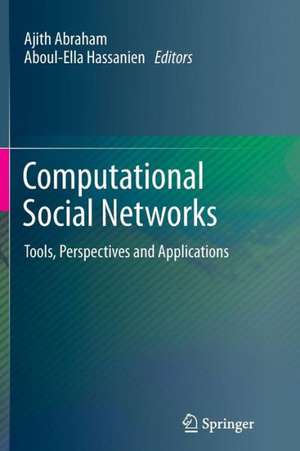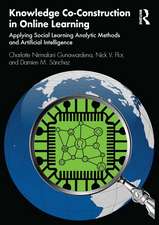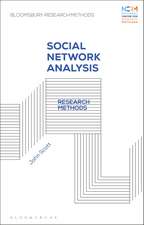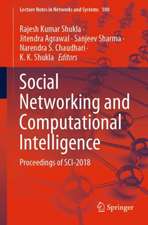Computational Social Networks: Tools, Perspectives and Applications
Editat de Ajith Abraham, Aboul-Ella Hassanienen Limba Engleză Paperback – 18 iul 2014
| Toate formatele și edițiile | Preț | Express |
|---|---|---|
| Paperback (1) | 527.64 lei 4-6 săpt. | |
| SPRINGER LONDON – 18 iul 2014 | 527.64 lei 4-6 săpt. | |
| Hardback (1) | 536.05 lei 4-6 săpt. | |
| SPRINGER LONDON – 28 iun 2012 | 536.05 lei 4-6 săpt. |
Preț: 527.64 lei
Preț vechi: 993.87 lei
-47%
Puncte Express: 791
Preț estimativ în valută:
93.33€ • 110.66$ • 81.31£
93.33€ • 110.66$ • 81.31£
Carte indisponibilă temporar
Specificații
ISBN-13: 9781447160090
ISBN-10: 1447160096
Pagini: 484
Ilustrații: XIV, 470 p.
Dimensiuni: 155 x 235 x 25 mm
Greutate: 0.68 kg
Ediția:2012
Editura: SPRINGER LONDON
Colecția Springer
Locul publicării:London, United Kingdom
ISBN-10: 1447160096
Pagini: 484
Ilustrații: XIV, 470 p.
Dimensiuni: 155 x 235 x 25 mm
Greutate: 0.68 kg
Ediția:2012
Editura: SPRINGER LONDON
Colecția Springer
Locul publicării:London, United Kingdom
Public țintă
ResearchCuprins
Part I: Modeling and Tools.- Computational Social Networks.- Hierarchical Graphical Models for Social and Behavioral Analysis and Forecasting.- Social Network Analysis Techniques for Social-Oriented Mobile Communication Networks.- Detection and Interpretation of Communities in Complex Networks.- Metrics and Models for Social Networks.- Structural Decompositions of Complex Networks.- Enhancing Online Communities with Cycle-Sharing for Social Networks.- Robustness and Prediction in Social Network Analysis.- Part II: Applications.- Social Networking Tools for Knowledge-Based Action Groups.- Dynamic Web Prediction using Asynchronous Mouse Activity.- PPMN.- Applications of Social Networks in Peer-to-Peer Networks.- Intelligent Social Networks of Devices.- Social Network-Based Media Sharing in the Ubiquitous Environment.- Customer Interaction Management Goes Social.- Real Emotions for Simulated Social Networks.- Social Networks for Learning.- Social Networks and Recommendation Systems.
Notă biografică
Dr. Ajith Abraham is the Director of Machine Intelligence Research (MIR) Labs, a global network of research laboratories with headquarters near Seattle, WA, USA. He is an author/co-author of more than 750 scientific publications. He is founding Chair of the International Conference on Computational Aspects of Social Networks (CASoN), Chair of the IEEE Systems Man and Cybernetics Society Technical Committee on Soft Computing (since 2008), and Distinguished Lecturer for the IEEE Computer Society representing Europe (since 2011).
Dr. Aboul-Ella Hassanien is a Professor in the Faculty of Computers and Information at Cairo University, Egypt, and Visiting Professor at the College of Business Administration, Kuwait University.
Dr. Aboul-Ella Hassanien is a Professor in the Faculty of Computers and Information at Cairo University, Egypt, and Visiting Professor at the College of Business Administration, Kuwait University.
Textul de pe ultima copertă
The study of computational social networks (CSNs) is an emerging interdisciplinary field, concerned with the intersection of social behavior and computer systems.
This comprehensive text/reference is the first of three volumes that illustrate the concept of social networks from a computational point of view. The book contains contributions from a international selection of world-class experts, with a specific focus on practical tools, applications, and open avenues for further research (the other two volumes review issues of Security and Privacy, and Mining and Visualization in CSNs).
Topics and features:
Dr. Ajith Abraham is Director of the Machine Intelligence Research (MIR) Labs, a global network of research laboratories with headquarters near Seattle, WA, USA. He is the editor of the book Distributed Multiple Description Coding, as well as many other Springer publications. Dr. Aboul-Ella Hassanien is Professor in the Faculty of Computers and Information at Cairo University, Egypt, and Visiting Professor at the College of Business Administration, Kuwait University. Dr. Hassanien and Dr. Abraham have co-edited numerous Springer titles, including the books Computational Social Network Analysis and Pervasive Computing.
This comprehensive text/reference is the first of three volumes that illustrate the concept of social networks from a computational point of view. The book contains contributions from a international selection of world-class experts, with a specific focus on practical tools, applications, and open avenues for further research (the other two volumes review issues of Security and Privacy, and Mining and Visualization in CSNs).
Topics and features:
- Includes a thorough introduction to this exciting and blossoming field
- Presents the latest advances in CSNs, and illustrates how organizations can gain a competitive advantage by applying these ideas in real-world scenarios
- Discusses the design and use of a wide range of computational tools and software for social networkanalysis
- Describes simulations of social networks, the representation and analysis of social networks, and the use of semantic networks in knowledge discovery and visualization
- Provides experience reports, survey articles, and intelligence techniques and theories relating to specific problems in network technology
Dr. Ajith Abraham is Director of the Machine Intelligence Research (MIR) Labs, a global network of research laboratories with headquarters near Seattle, WA, USA. He is the editor of the book Distributed Multiple Description Coding, as well as many other Springer publications. Dr. Aboul-Ella Hassanien is Professor in the Faculty of Computers and Information at Cairo University, Egypt, and Visiting Professor at the College of Business Administration, Kuwait University. Dr. Hassanien and Dr. Abraham have co-edited numerous Springer titles, including the books Computational Social Network Analysis and Pervasive Computing.
Caracteristici
Provides the latest advances in computational social networks, and illustrates how organizations can gain a competitive advantage by applying these ideas in real-world scenarios Presents a specific focus on practical tools and applications Provides experience reports, survey articles, and intelligence techniques and theories relating to specific problems in network technology


















